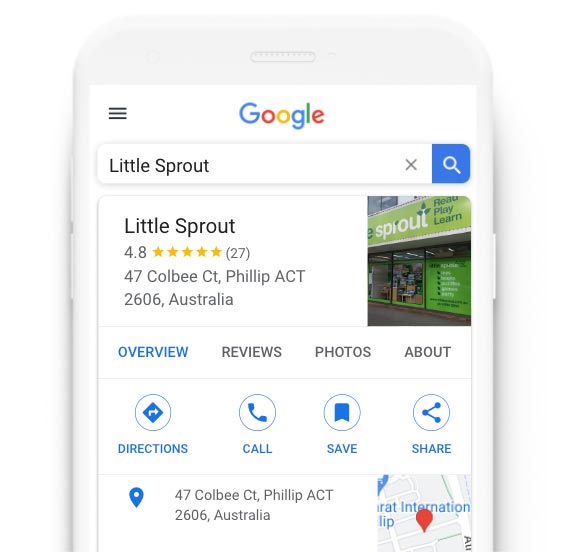

Google Search Ads 101
Detailed Google Search Ads setup guide for small and local business
Part 2
Targeting
In this video we’ll go through what targeting means for Google Search Ads and we’ll work on getting your first keywords.
Timestamps
0:00 – Introduction
0:33 – What is “targeting” for Google Search Ads
2:09 – Our first keywords
3:21 – More specific keywords
5:38 – Competitor names
5:53 – Outro
Prefer to read? Click here for the transcript
Welcome back to part 2 of setting up your first Google Search Ads campaign.
In this one we’re going to get into targeting and a quick heads-up, there’s going to be some work involved because I think that between you and me, you probably know your business and its customers best.
So throughout I’ll suggest pausing the video a couple of times to give you an opportunity to do the work.
I promise none of that work will be difficult or take very long, you don’t even need a computer to do it. But it is important work, because the more right you get this, the more effective your ads will be.
Right. So targeting. When we say targeting we mean who we want our ads to be seen by.
This is often where people start thinking about things like gender, age brackets, interests, etcetera.
Those things are important to know about your customers, but less so for what we’re trying to do here, because we don’t actually need to find people.
People are already trying to find us. Our job is simply to make sure we’re found when the right people are searching.
So in the context of search ads, gender, age brackets and all those other things are less important. It’s more about deciding how a potential customer would be searching for us, or to be more precise; what types of things they would type into Google to try and find us.
Now you might think “easy, I’m a plumber and people looking for a plumber would just type in “plumber”.
And to be fair, you would probably be right. A lot of people would just type in that word and call it good.
The problem is that it’s quite a broad term.
You would absolutely get a lot of people that are looking for a plumber, but what if someone is looking for a plumber to do their apprenticeship with? Or someone is using Google to check how to spell the word “plumber”? Maybe someone just wants to look up the Wikipedia page for plumbers.
A lot of those people would also type “plumber” into Google even though they have no intention of becoming your customer.
Google is still charging you to show the ad all the same though.
So we want to capture that intent bit that we spoke about before.
For example if someone uses the word “plumber” and adds their suburb name, I think we can both agree they’re probably looking for a local plumber and not the Wikipedia page on plumbing.
This is also why I mentioned in the previous video that this guide only makes sense if you’re a business targeting a specific local area, because as soon as you go a lot broader, things quickly become more complicated.
Right, so that’s all the background out of the way. Now let’s actually go and do something and write down our first actual search terms.
To get you started I’ll give you three keywords using the plumber example. Just write those down and simply swap out the plumber bit for your service.
Makes sense? Cool.
First one: “Local plumber”
Then “Plumber near me”
And for the third one we’ll do “Affordable plumber”
Pretty simple right?
Now I suggest pausing the video here and try to come up with another 5 to 10 or so search terms like it, that you think a potential customer would use when searching for your service.
Remember, keep it simple and I’ll see you in a bit.
Welcome back. How did you go? If you struggled with it a bit, don’t worry. This whole thing is a little weird after all, thinking about what people are typing into a search engine.
But you may have some things on your list now with words like “best”, “reliable”, “fast”, “phone number” or “review”
And if you have about 10 things on your list, that’s a good start. Consider that a little warm up.
Because the next one is going to be a bit more difficult and unfortunately I won’t be able to help with that one as much.
That’s because we’re going to go into the specifics of your business.
So far these search terms have all been pretty generic after all. Replace the word “plumber” by “sparky” and they would still work just as well.
They are a good place to start and if you were to run with just those, you would absolutely see a result.
But because they’re so generic, they’re also pretty much what everyone else does, meaning they are quite competitive.
And in the world of digital advertising “competitive” means “expensive”.
So to be more competitive, we need to get a little smarter and the way to do that is to try and reach people júst before they realise they need you.
Let’s use the plumber example again.
If my toilet flushes a little weird, I’m probably not really thinking about getting a plumber in yet.
But if I’m standing knee deep in water after 30 minutes of swearing at a useless Woolies plunger, I’m going to be searching for a plumber and I no longer care what it costs.
Somewhere in between those two moments something changes and if we can nail that moment perfectly, we should end up with some very effective ads.
So here’s what that might look like in search terms.
If I search “How do I stop a toilet from overflowing” that clearly shows that I’m trying to fix the problem myself. With a Woolies plunger for example.
So showing our ads on this search term would be a waste because the search shows I’m specifically trying to avoid bringing in the pros.
But if I search for “what if toilet plunger doesn’t stop overflowing toilet”, I’ve clearly changed my mind. I not only show through my search term that I have a problem, but also that the solution I tried didn’t work and that now I’m open to other solutions.
This might be a good time to have an ad that says you’re an affordable, local plumber that’s not only fast, but also happens to specialise in toilets.
This is where I’m going to hand over to you though, because you know your business and your customers best, and definitely better than I do.
You know exactly what led your customers to become your customers and the journey they took to find you.
So pause the video again and try to come up with 10 or so examples of what your customers might have typed into Google before they became a customer.
Done? Perfect.
You’ve just done what is by far the hardest part of this whole guide, because it really requires a bit of a deep dive into the thinking and behaviour of people.
Especially if you’ve never really thought about your customers in this way, it can take a bit of time to properly get your head around.
And you can always come back later to take another stab at it.
For now let’s close off with a simple one.
Pause the video again and write down the names of all your local competitors. That’s it.
Right if that’s all done, you should now have a list of about 20 search terms along with a bunch of competitor names.
If you’re happy with those and ready to start working on your ads, you can jump straight to the next video using the button below.
If you prefer to spend a bit more time on what you’ve written down, that’s completely fine too. The better you get this bit, the better your results will be later.
Either way, I’ll be waiting for you in the next video.


If you need performance marketing, you need to work with these guys. I would highly recommend them to anyone in my network looking for results.
Head of digital, Rapid Rise
Knowing our marketing is looked after and looked after well has been incredibly valuable to our business.
COO, The Solar Power Co.

Get started
Find out the true marketing potential of your business
Your FREE strategy session will uncover excactly what to do to start getting better results from your marketing, including:
Optimisation opportunities to help you reduce wasted budget
Identify the low hanging fruit that will propel your business forward
A step-by-step list showing exactly how to extract a better ROI from your marketing efforts





